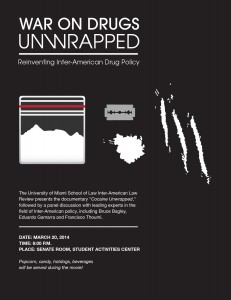BY LEA UDLER, Symposium Editor Vol. 45 — On January 27, 2014, the Supreme Court of Florida, in an advisory opinion, held that “voters are given fair notice as to the chief purpose and scope of [a] proposed amendment [to Section 29 of Article X of the Florida Constitution], which is to allow a restricted use of marijuana for certain ‘debilitating’ medical conditions.”[1] With the proposed amendment for legal use of medical marijuana now on the ballot, Florida exemplifies an ongoing shift in drug policy ideology in the United States. Colorado and Washington adopted similar amendments in 2012 and recently began implementing regulations for marijuana use; the Affordable Health Care Act seeks to treat addiction as a chronic health issue instead of a crime; and bipartisan efforts to reform the system of mass incarceration for non-violent drug offenses are brewing in Congress.[2] This new approach to drug decriminalization is a stark departure from U.S. policy in the last few decades.
Following President Nixon’s ‘War on Drugs’ declaration in 1971, the United States adopted a hard line against drug production and consumption that largely shaped the political, economic, and legal relations with Latin America. Within the United States, zero tolerance policies led to skyrocketing incarceration rates for non-violent drug offenses. In Latin America, the United States targeted its funding and diplomacy to encourage expansive drug enforcement to curtail the production of cocaine and marijuana.[3] To retain preferential trade agreements and U.S. aid, many Latin American countries adopted aggressive counter narcotic programs: forced eradications; increased penalties for drug possession and production; allowing military aid and intervention in drug producing areas; and fostering economic turmoil amongst coca growers.[4] Forty-four years later, those policies have proven to be largely ineffective and have had a substantial impact on inter-American relations.
We must therefore question if the recent ‘liberalization’ of drug policy in the United States is finally the end to our War on Drugs. Perhaps this policy shift is a reluctant acceptance by the United States that more liberalized Latin American drug policies are the correct ones? For example, Bolivia legalized coca production in 2009 in favor of alternative economic markets for the coca leaf. Ecuador implemented decriminalization of drug consumption and proportionate drug sentencing that same year. Uruguay began to legally regulate marijuana use in 2013, and Colombia is currently drafting a peace agreement with the FARC (Revolutionary Forces of Colombia), a long-standing subversive group that currently finances itself through drug trafficking.
As the U.S. enters this new era of drug legislation, what will the ramifications be for issues that have been plaguing the Western hemisphere for decades? The drug trade has had negative consequences on the economic market: money laundering has become ubiquitous, from art dealing to tax haven jurisdictions; low work-force immersion rates amongst ex-convicts and at-risk youth; and rising operational costs to sustain counter narcotic efforts. Socially, drug policy has had an even more devastating effect: violence has prompted massive emigration from Central America into the United States; forced eradications have displaced many farmers and indigenous communities from their homes, and ineffective laws and programs have weakened several Latin American democracies and caused political upheaval. Are the reforms within the United States indicative of a more sensible approach to these issues abroad?
For answers to these questions (and more) please join the Inter-American Law Review on Thursday, March 20th, for the screening of the documentary “Cocaine Unwrapped” followed by a panel discussion with inter-American drug policy experts including Professor Bagley, Professor Gamarra and Professor Thoumi. Our event will be held at 6 p.m. in the Senate Room of the new Student Center at the University of Miami. For more information, please click here.
<a href="http://inter-american-law-review.law.miami achat le viagra.edu/wp-content/uploads/2014/02/Panel-Flyer.jpg”>




